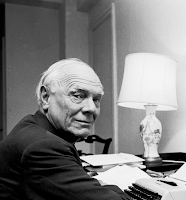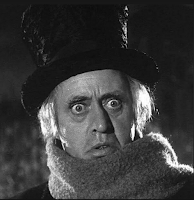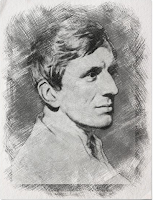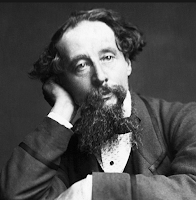In the previous posting on this subject, we noted that Ebenezer Scrooge, the, er, hero (or maybe “victim”?) of Charles Dickens’s 1843 story “A Christmas Carol” was portrayed as a strictly honest man, despite later dramatic characterizations that made him seem like a minor Robber Baron or major sneak thief. Scrooge’s iron rectitude is, in fact, essential to the plot, as otherwise Dickens’s story could have been dismissed (at least within the context of the fictional world) as a lie or a delusion.
So, Scrooge may have been many things, but his word was good, even if he wasn’t, although perhaps “incomplete” or “unfulfilled” might be better. He was, after all, a good man of business — which, while not itself a bad thing, is far from enough. Scrooge wasn’t actually bad or evil. He just wasn’t good in the broadest sense. That is why Dickens described him not as a criminal, per se, but as “a squeezing, wrenching, grasping, scraping, clutching, covetous old sinner!” This, too, is essential to the story to demonstrate the power of the grace that comes to Scrooge when he accepts it and converts himself to become more fully human, that is, virtuous.
In passing, we should note that religious people of a proselytizing bent like to think of making conversions, and thereby getting in good with God . . . but it doesn’t work that way. People used to ask Fulton Sheen how many people he had converted, and he always responded he never counted, as then he might start thinking he was doing it rather than God and the convert accepting grace.
 |
| Malcolm Muggeridge |
Someone once asked Malcolm Muggeridge why he didn’t convert despite his friendship with Mother Teresa, and he growled, “No grace.” Later after he converted, his answer to why he had done so was a dismissive and curt, “Grace.” There are some things that are more important than racking up a score.
. . . such as actually living up to the principles of your faith or philosophy instead of running other people’s lives and forcing them to measure up to your high standards, the ultimate “Do as I say, not as I do.” This is an easy trap to fall into when you base everything on faith in your own opinion, whether you’re a natural materialist socialist or a supernatural spiritual modernist. It’s important to keep in mind at all times that the supernatural fulfills and completes the natural, just as charity fulfills and completes reason, faith fulfills and completes reason, and so on.
 |
| "There goes my characterization!" |
That is why, unlike the honest Scrooge who ended by fulfilling justice with charity and reason with faith, the socialists, modernists, and even what we can call “traditionalist-modernists” all jettison justice and reason and put everything on faith and charity. Yes, Scrooge fulfilled and completed his reason with faith once the spirits of Christmas gave him the key that unlocked the door that opened and let grace in. Being honest with himself, and having the courage of his convictions, he then became the best man he could be, just as he had been the best miser and skinflint in the City of London.
 |
| John Henry Newman |
So, there is a Christian foundation to the story; it’s not a secular parable for a commercial holiday. It’s very subtle, as Dickens was not writing a religious tract, and he was a rather “broad” Christian in any event, although definitely a believer. He might have thought there was a bit too much “pushing” religion going on already, what with John Henry Newman and the Oxford Movement in full swing, so he had to be careful, what with the Evangelicals and Catholics so much in the news, neither of which he cared for (and Newman was an Evangelical who became a Catholic!). He wanted to sell books, not preach. He did, however, insert God into his story, and not only with Tiny Tim’s exclamation. You just have to look for it and be aware of it when you find it.
 |
| Charles Dickens |
Thus — if you know what to look for — it becomes very clear that Dickens did not think that charity could replace justice, faith could replace reason . . . something a lot of people today still have trouble with. They think that by calling charity justice, they don’t have to meet the demands of justice. That is how many of today’s super-rich justify (an interesting word in this context) maintaining barriers that prevent others from accessing money and credit to become owners of capital.
Instead, the super-rich support government programs and monetary policies that beggar ordinary people and turn them into wards of the State. Worse, they fund “population control” to get rid of the unfit (unfit for what? as Chesterton would complete the sentence), the unwanted (by whom?), the useless eaters, and so on. Still, despite the massive amounts of money spent to eliminate such undesirables, the promised Kingdom of God on Earth always seems increasingly distant.
Where Scrooge used his own money to give the poor a temporary helping hand, today’s super-rich are willing to hand out fortunes in “charity,” especially when it’s other people’s money, to maintain people permanently in a condition of dependency. Even a huge fortune dispensed in this way, however, does not make up for the injustice of denying others their natural rights of life, liberty, and private property — which would actually cost them less money, but diminish their power over others.
#30#

